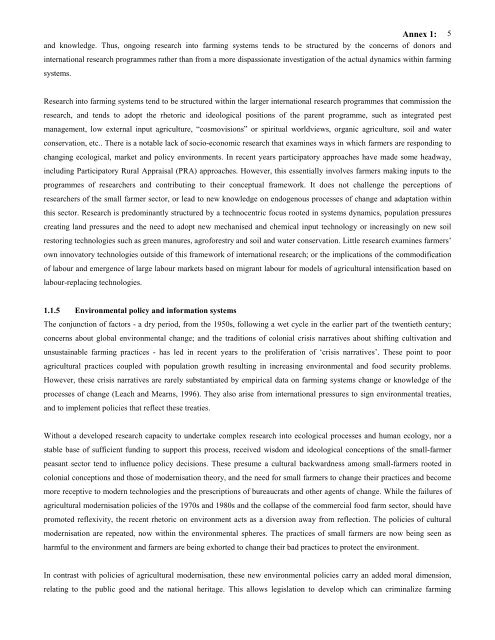Poverty Dimensions of Public Governance and Forest Management ...
Poverty Dimensions of Public Governance and Forest Management ...
Poverty Dimensions of Public Governance and Forest Management ...
You also want an ePaper? Increase the reach of your titles
YUMPU automatically turns print PDFs into web optimized ePapers that Google loves.
Annex 1: 5<br />
<strong>and</strong> knowledge. Thus, ongoing research into farming systems tends to be structured by the concerns <strong>of</strong> donors <strong>and</strong><br />
international research programmes rather than from a more dispassionate investigation <strong>of</strong> the actual dynamics within farming<br />
systems.<br />
Research into farming systems tend to be structured within the larger international research programmes that commission the<br />
research, <strong>and</strong> tends to adopt the rhetoric <strong>and</strong> ideological positions <strong>of</strong> the parent programme, such as integrated pest<br />
management, low external input agriculture, “cosmovisions” or spiritual worldviews, organic agriculture, soil <strong>and</strong> water<br />
conservation, etc.. There is a notable lack <strong>of</strong> socio-economic research that examines ways in which farmers are responding to<br />
changing ecological, market <strong>and</strong> policy environments. In recent years participatory approaches have made some headway,<br />
including Participatory Rural Appraisal (PRA) approaches. However, this essentially involves farmers making inputs to the<br />
programmes <strong>of</strong> researchers <strong>and</strong> contributing to their conceptual framework. It does not challenge the perceptions <strong>of</strong><br />
researchers <strong>of</strong> the small farmer sector, or lead to new knowledge on endogenous processes <strong>of</strong> change <strong>and</strong> adaptation within<br />
this sector. Research is predominantly structured by a technocentric focus rooted in systems dynamics, population pressures<br />
creating l<strong>and</strong> pressures <strong>and</strong> the need to adopt new mechanised <strong>and</strong> chemical input technology or increasingly on new soil<br />
restoring technologies such as green manures, agr<strong>of</strong>orestry <strong>and</strong> soil <strong>and</strong> water conservation. Little research examines farmers’<br />
own innovatory technologies outside <strong>of</strong> this framework <strong>of</strong> international research; or the implications <strong>of</strong> the commodification<br />
<strong>of</strong> labour <strong>and</strong> emergence <strong>of</strong> large labour markets based on migrant labour for models <strong>of</strong> agricultural intensification based on<br />
labour-replacing technologies.<br />
1.1.5 Environmental policy <strong>and</strong> information systems<br />
The conjunction <strong>of</strong> factors - a dry period, from the 1950s, following a wet cycle in the earlier part <strong>of</strong> the twentieth century;<br />
concerns about global environmental change; <strong>and</strong> the traditions <strong>of</strong> colonial crisis narratives about shifting cultivation <strong>and</strong><br />
unsustainable farming practices - has led in recent years to the proliferation <strong>of</strong> ‘crisis narratives’. These point to poor<br />
agricultural practices coupled with population growth resulting in increasing environmental <strong>and</strong> food security problems.<br />
However, these crisis narratives are rarely substantiated by empirical data on farming systems change or knowledge <strong>of</strong> the<br />
processes <strong>of</strong> change (Leach <strong>and</strong> Mearns, 1996). They also arise from international pressures to sign environmental treaties,<br />
<strong>and</strong> to implement policies that reflect these treaties.<br />
Without a developed research capacity to undertake complex research into ecological processes <strong>and</strong> human ecology, nor a<br />
stable base <strong>of</strong> sufficient funding to support this process, received wisdom <strong>and</strong> ideological conceptions <strong>of</strong> the small-farmer<br />
peasant sector tend to influence policy decisions. These presume a cultural backwardness among small-farmers rooted in<br />
colonial conceptions <strong>and</strong> those <strong>of</strong> modernisation theory, <strong>and</strong> the need for small farmers to change their practices <strong>and</strong> become<br />
more receptive to modern technologies <strong>and</strong> the prescriptions <strong>of</strong> bureaucrats <strong>and</strong> other agents <strong>of</strong> change. While the failures <strong>of</strong><br />
agricultural modernisation policies <strong>of</strong> the 1970s <strong>and</strong> 1980s <strong>and</strong> the collapse <strong>of</strong> the commercial food farm sector, should have<br />
promoted reflexivity, the recent rhetoric on environment acts as a diversion away from reflection. The policies <strong>of</strong> cultural<br />
modernisation are repeated, now within the environmental spheres. The practices <strong>of</strong> small farmers are now being seen as<br />
harmful to the environment <strong>and</strong> farmers are being exhorted to change their bad practices to protect the environment.<br />
In contrast with policies <strong>of</strong> agricultural modernisation, these new environmental policies carry an added moral dimension,<br />
relating to the public good <strong>and</strong> the national heritage. This allows legislation to develop which can criminalize farming
















